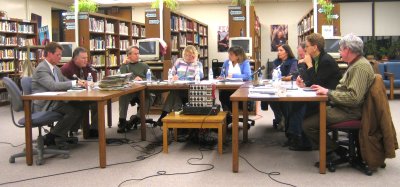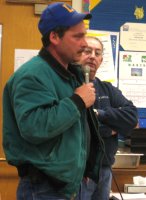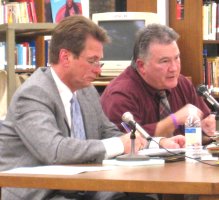- By Dan Veaner
- News
 Print
Print
The Lansing Board of Education held a special budget workshop meeting last week to help decide what should be in the 2007-2008 school budget and how much to ask district taxpayers to ante up. Most of the workshop was taken up by a presentation by District Business Administrator Larry Lawrence, who provided a 28 page line-item packet. "Right off the top I choose to make the statement that I believe that the tax climate in our community is going to mitigate against any kind of tax increases above what would be considered inflationary," Lawrence told the Board. "For that reason I am proposing a regulatory capped budget. That is the maximum increase in a contingent budget is 3.84% and I am proposing that we go to a budget of 3.84% increase."

(Left to right) Superintendent Mark Lewis, Business Administrator Larry Lawrence,
School Board members Dan Brown, Anne Drake, Bonita Lindberg,
Christine Iacobucci, Glenn Swanson, Sandi Dhimitri, and Tom Keane
A contingency budget is enforced by the State on districts whose budgets fail to gain approval from taxpayers. These budgets are capped, and the way the money is spent regulated by State agencies. When the first budget proposal failed last year some taxpayers argued that while the second proposal was still too high voters should approve it to prevent a contingency budget from being enforced. They argued that such a budget would cripple programs and be bad for kids. Evidently voters were swayed by that argument, because the second budget of $21,366,871 passed.
But even proponents of the second budget were clear that a better process must be developed for forming budgets that the community can support. Prior to the workshop the proposed budget added up to $22,274,155, which would have been $907,284 more than this year's budget. This has been in development in consultation with a budget committee, formed to address the community's desire to be more involved in the process. They considered the district's new long-range plan, collective bargaining agreements, mandated increases, district goals, and voter input gained through an exit poll distributed at last year's budget vote.
Lawrence paid attention to the community's input on why the first budget failed and the second passed as well as to the failed capital improvement initiative last month. He concluded that the community will not accept a $22,274,155 budget that would be $0.9 million more than this year's budget. That was why he proposed a truncated budget that is no higher than a contingency budget would be if imposed by the State, reasoning that if the budget goes no higher than the State cap, voters will accept it because for the same money it avoids State mandates on how the money is spent. He recommended that the bus proposition be separated from the main budget proposition.
His agenda included frank discussion about the tax climate in the community, the regulatory capped budget, overall revenue picture, and property value status. "I want to talk a little bit more about budgetary objectives which we said earlier are maintaining existing and required programs, operations and facilities, and necessary additional staffing that is in this budget proposal," he said. "We'll discuss the retirement agreement that has just been signed by the district Superintendent and the Lansing Faculty Association, and discuss a proposed equipment proposition which includes three busses, a truck with a plow, and a van for transporting special needs students."
But Lawrence was clear that some goals the committee and district officials had for next year can not be realized in the capped budget. These include planned and preventative maintenance, transportation facility "green" improvements, upgrading and balancing HVAC controls in the school buildings, and investing in improvements that would yield an economic payback such as more efficient heating equipment that would cost less to operate.
Board members said they were troubled by that, especially the money for preventative maintenance. "When we were talking about the capital project," said Board President Bonita Lindberg, "we heard it here and we heard it from the other surrounding districts -- why are we using capital money on repairs, why didn't we take care of it when it happened? If we don't take care of these buildings they will continue to further decline. I am very concerned about removing that money from the budget."
Exacerbating the process is uncertainty about the coming year's revenue. Lawrence said that final property value numbers won't be available until the end of March, and that he hasn't yet determined the district's fund balance, having just cut off expenditures for the year. He also noted that the district is still applying for excess cost aid. "That hasn't shown up yet in any of our projections for next year," he said. "I am concerned about that."
Lawrence asked the Board for direction on how to proceed in developing the budget. "If it's the Board's pleasure to come in with a budget that is 3.84% I'd like to hear that tonight," he said. "If not I'll stop spinning my wheels to do it."
Tom Keane, Dan Brown, Sandi Dhimitri, and Glenn Swanson said they thought that rate was acceptable. "I think 3.8 is reasonable," Swanson said. "I think we'd all agree that we'd like to see it lower, but I don't see an opportunity to do that and maintain programs that we want to maintain." Anne Drake and Christine Iacobucci disagreed. "You know I would prefer to go lower," Drake said. "But I'm not quite sure how to do that."
Teacher and resident Julie Berens asked the board to consider charging for programs such as driver education to free money for programs all students need, and noted that she hears complaints from the community that the administration is top-heavy. Iacobucci agreed. "There is definitely the sense of a top-heavy administration," she said. "We've heard that since (former Superintendent) Dr. Kaiser was here. As I have sat on the board repeatedly I've wondered what are we doing to check on the efficacy of our departments and programs, and on their efficiency?"
Lindberg seemed comfortable with the amount, but, like Iacobucci, wanted to consider allocating it differently. "I can live with us continuing to work along this line," Lindberg said. "I'm not absolutely convinced that the allocation of this money is where I am most comfortable with it. I need to give some more thought to that."
Lindberg said that with uncertainty about revenue that more time needed to be spent on developing a final budget. "I don't know how we effectively have the final numbers together when we vote on them in April without having that until the end of the month," she said. Swanson suggested scheduling another working session before the Board votes on a final budget, and the Board adjusted their meeting schedule to accommodate more discussion between then and now. "That would be my preference," Lindberg said. "The most important thing this board faces right now is getting this budget together."
"The good news is that we made it this year we're going to make it through next year," Lawrence told the Board. "This is not a disaster budget. This is a budget that sustain our programs. I'd like to think that the community could look at this and say 'OK you worked hard to answer our needs while maintaining expenditures.'"
----
v3i11

(Left to right) Superintendent Mark Lewis, Business Administrator Larry Lawrence,
School Board members Dan Brown, Anne Drake, Bonita Lindberg,
Christine Iacobucci, Glenn Swanson, Sandi Dhimitri, and Tom Keane
A contingency budget is enforced by the State on districts whose budgets fail to gain approval from taxpayers. These budgets are capped, and the way the money is spent regulated by State agencies. When the first budget proposal failed last year some taxpayers argued that while the second proposal was still too high voters should approve it to prevent a contingency budget from being enforced. They argued that such a budget would cripple programs and be bad for kids. Evidently voters were swayed by that argument, because the second budget of $21,366,871 passed.
But even proponents of the second budget were clear that a better process must be developed for forming budgets that the community can support. Prior to the workshop the proposed budget added up to $22,274,155, which would have been $907,284 more than this year's budget. This has been in development in consultation with a budget committee, formed to address the community's desire to be more involved in the process. They considered the district's new long-range plan, collective bargaining agreements, mandated increases, district goals, and voter input gained through an exit poll distributed at last year's budget vote.
Lawrence paid attention to the community's input on why the first budget failed and the second passed as well as to the failed capital improvement initiative last month. He concluded that the community will not accept a $22,274,155 budget that would be $0.9 million more than this year's budget. That was why he proposed a truncated budget that is no higher than a contingency budget would be if imposed by the State, reasoning that if the budget goes no higher than the State cap, voters will accept it because for the same money it avoids State mandates on how the money is spent. He recommended that the bus proposition be separated from the main budget proposition.
His agenda included frank discussion about the tax climate in the community, the regulatory capped budget, overall revenue picture, and property value status. "I want to talk a little bit more about budgetary objectives which we said earlier are maintaining existing and required programs, operations and facilities, and necessary additional staffing that is in this budget proposal," he said. "We'll discuss the retirement agreement that has just been signed by the district Superintendent and the Lansing Faculty Association, and discuss a proposed equipment proposition which includes three busses, a truck with a plow, and a van for transporting special needs students."
 Buildings & Grounds Supervisor Glen Fenner (left) and District Transportation Supervisor Louis Varga explain their departments' needs. |  Business Administrator Larry Lawrence (right) recommends a 3.84% budget while Superintendent Mark Lewis looks on |
But Lawrence was clear that some goals the committee and district officials had for next year can not be realized in the capped budget. These include planned and preventative maintenance, transportation facility "green" improvements, upgrading and balancing HVAC controls in the school buildings, and investing in improvements that would yield an economic payback such as more efficient heating equipment that would cost less to operate.
Board members said they were troubled by that, especially the money for preventative maintenance. "When we were talking about the capital project," said Board President Bonita Lindberg, "we heard it here and we heard it from the other surrounding districts -- why are we using capital money on repairs, why didn't we take care of it when it happened? If we don't take care of these buildings they will continue to further decline. I am very concerned about removing that money from the budget."
Exacerbating the process is uncertainty about the coming year's revenue. Lawrence said that final property value numbers won't be available until the end of March, and that he hasn't yet determined the district's fund balance, having just cut off expenditures for the year. He also noted that the district is still applying for excess cost aid. "That hasn't shown up yet in any of our projections for next year," he said. "I am concerned about that."
Lawrence asked the Board for direction on how to proceed in developing the budget. "If it's the Board's pleasure to come in with a budget that is 3.84% I'd like to hear that tonight," he said. "If not I'll stop spinning my wheels to do it."
Tom Keane, Dan Brown, Sandi Dhimitri, and Glenn Swanson said they thought that rate was acceptable. "I think 3.8 is reasonable," Swanson said. "I think we'd all agree that we'd like to see it lower, but I don't see an opportunity to do that and maintain programs that we want to maintain." Anne Drake and Christine Iacobucci disagreed. "You know I would prefer to go lower," Drake said. "But I'm not quite sure how to do that."
Teacher and resident Julie Berens asked the board to consider charging for programs such as driver education to free money for programs all students need, and noted that she hears complaints from the community that the administration is top-heavy. Iacobucci agreed. "There is definitely the sense of a top-heavy administration," she said. "We've heard that since (former Superintendent) Dr. Kaiser was here. As I have sat on the board repeatedly I've wondered what are we doing to check on the efficacy of our departments and programs, and on their efficiency?"
Lindberg seemed comfortable with the amount, but, like Iacobucci, wanted to consider allocating it differently. "I can live with us continuing to work along this line," Lindberg said. "I'm not absolutely convinced that the allocation of this money is where I am most comfortable with it. I need to give some more thought to that."
Lindberg said that with uncertainty about revenue that more time needed to be spent on developing a final budget. "I don't know how we effectively have the final numbers together when we vote on them in April without having that until the end of the month," she said. Swanson suggested scheduling another working session before the Board votes on a final budget, and the Board adjusted their meeting schedule to accommodate more discussion between then and now. "That would be my preference," Lindberg said. "The most important thing this board faces right now is getting this budget together."
"The good news is that we made it this year we're going to make it through next year," Lawrence told the Board. "This is not a disaster budget. This is a budget that sustain our programs. I'd like to think that the community could look at this and say 'OK you worked hard to answer our needs while maintaining expenditures.'"
----
v3i11



